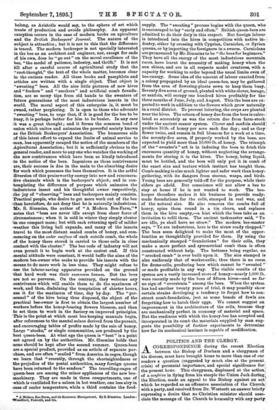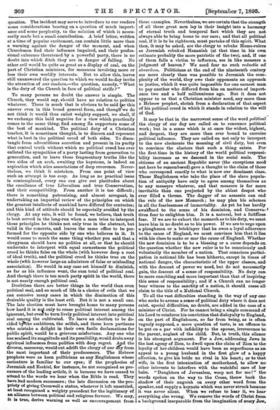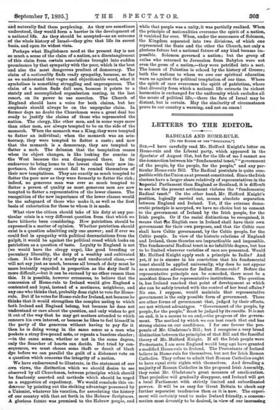POLITICS AND THE CLERGY.
ACORRESPONDENCE during the recent Election between the Bishop of Darham and a clergyman of his diocese, must have brought home to more than one of our readers a question (suggested by much else at the present crisis) of perennial importance, and special significance for the present hour. This clergyman, displeased at the action of a confrere in flying from his steeple the Union Jack during the Election, made an appeal to the Bishop against an actl which he regarded as an offensive association of the Church with a party, and received from Dr. Westcott an answer briefly expressing a desire that no Christian minister should asso- ciate the message of the Church to humanity with any party
question. The incident may serve to introduce to our readers some considerations bearing on a question of much import. ance and some perplexity, to the solution of which it neces- sarily made but a small contribution. A brief letter, written at a time of popular excitement, can contain little more than a warning against the danger of the moment, and when Churchmen find their influence impaired, and their profes- sional existence threatened by a powerful party, there is no doubt into which ditch they are in danger of falling. No other evil would be quite as great as a display of zeal, on the part of Christian ministers, for measures involving more or less their own worldly interests. But to allow this, leaves still unanswered the question to which we would to-day invite the attention of our readers,—the question, namely, " What is the duty of the Church in face of political strife ?"
To many persons no doubt the answer is simple. The Church, they would say, should have no relation to politics whatever. There is much that is obvious to be said ;sr this answer even in this broad general form, and though we do not think it would thus enlist weighty support, we shall, if we exchange this bald negative for a view which practically comes to the same thing, find among its supporters some of the best of mankind. The political duty of a Christian teacher, it is sometimes thought, is to discern and represent what is best in the political creed of both sides. To disen- tangle from adventitious accretion and present in its purity that central truth without which no political creed has ever enlisted the sympathies of a party lasting from generation to generation, and to leave these fragmentary truths like the two sides of an arch, awaiting the keystone, is indeed an aspiration which stirs associations of deep reverence. Never- theless, we think it mistaken. From one point of view such an attempt is too easy. As long as no practical issue is contemplated, every one can give out platitudes about the excellence of true Liberalism and true Conservatism, and their compatibility. From another it is too difficult; there is something patronising, and almost arrogant, in undertaking an impartial review of the principles on which the greatest intellects of mankind have differed for centuries; and this kind of attitude should be especially avoided by the clergy. At any rate, it will be found, we believe, that truth is best served in the long-run when a man tries to interpret those principles he thinks not only true in the abstract, but valid in the concrete, and leaves the same office to be per- formed for the opposite side by one who believes in it. It would come to much the same thing whether you said that a clergyman should have no politics at all, or that he should undertake to interpret with equal earnestness the political creed he thinks false on the whole (with however deep a root of ideal truth), and the political creed he thinks true on the whole (with however large an admixture of false or misleading association). He would in any case set himself to diminish, as far as his influence went, the sum total of political zeal. And though there is too much party spirit in the world, there is not nearly enough political zeal.
Donbtlees there are better things in the world than even political seal, and so much of life is a choice of evils that we can conceive many cases in which the diminution of this desirable quality is the least evil. But it is not a small one. The late election must have brought home to many persons how hard it is mit only to rouse political interest among the ignorant, but even to turn lively political interest into political zeal among the cultivated. To leave an election to be de- cided b3ithe ambitious, the selfish, and those keen partisans who mistake a delight in their own facile declamations for public spirit, would be a grievous misfortune. Any one who has realised its magnitude and its possibility, would drain away spiritual influences from politics with deep regret. 4d the divorce, moreover, would cut adrift the clergy of our dEy from the most important of their predecessors. The Hebrew prophets were as keen politicians as any Englishman whose caricature is familiar to our eyes ; if the prophecies of Jeremiah and Ezekiel, for instance, be not recognised as pre- cursors of the leading article, it is because we have ceased to attend to the words we hear when the Bible is read. They have had modern successors; the late discussion on the pro- pnety of giving Cromwell a statue, whatever it left unsettled, at least recognised a weighty precedent for the legitimacy of an alliance between political and religions fervour. We may, at is true, derive warning as well as encouragement from .
these examples. Nevertheless, we are certain that the strength of all these great men lay in their insight into a harmony of eternal truth and temporal fact which they are not always able to bring home to our ears ; and that all political zeal, if it is to be righteous, must partake of this spirit. What then, it may be asked, are the clergy to rebuke Home-rulers as Jeremiah rebuked Hananiah (at that time in his own estimate probably the more patriotic of the two), and, if one of them falls a victim to influenza, see in like measure a, judgment of heaven ? We need fear no such reductio ad' absurdum,. Politicians at the end of the nineteenth century see more clearly than was possible to Jeremiah the com- plexity of the world, they owe their opponents an approach to justice, which it was quite impossible for one earnest man to pay another who differed from him on matters of import- ance two and a half millenniums ago. But it does not appear to us that a Christian minister need, any more than a Hebrew prophet, shrink from a declaration of that aspect of his political creed in which it stands in relation to the will of God.
It may be that in the narrowest sense of the word politwat the clergy of our day are called on to renounce political work;; but in a sense which is at once the widest, highest„ and deepest, they are more than ever bound to exercise political influence. They are called on not only to interpret to the new electorate the meaning of civil duty, but even to convince the electors that such a thing exists. For the first time in the history of the world political responsi- bility increases as we descend in the social scale. The citizens of an ancient Republic never (the exceptions need not here be remembered) gave a thought to the claim of those who correspond exactly to what is now our dominant class.. Those Englishmen who take the place of the slave popula- tion of antiquity have only to agree among themselves as to any measure whatever, and that measure is far more inevitable than one projected by the ablest despot who, ever filled a throne. The dagger of no assassin can end the rule of the new Monarch ; he may plan his schemes in all the fearlessness of immortality. As yet he has hardly awaktned to the sense of his dominion, and Conserve- f fives fear to enlighten him. It is a natural, but a faittese fear. If we are to exhort the monarch as to his duty, we must leave him in no doubt as to his power. If we are to urge upon a ploughman or a bricklayer that he owes a loyal adherence to the cause of England, we must convince him that it lies with his class to make or mar the cause of England. Whether the new dominion is to be a blessing or a curse depends on the question whether the new ruler is to be consciously and voluntarily the member of a nation. That conscious partici- pation in national life has been hitherto, except in times of national danger, the characteristic of the upper classes, and with the descent of power we need, but do not necessarily gain, the descent of a sense of responsibility. No duty can be more ennobling and more important than that of inspiring. this sense of responsibility; and if a Church can no longer- bear witness to the sanctity of a nation, it should cease all claim to the title of a National Church.
To all the vast difficulties standing in the way of any one who seeks to arouse a sense of political duty where it does not exist, special difficulties, no doubt, are added in the case of a. minister of Christ. For he cannot bring a single command of his Lord to reinforce his conviction that disloyalty to England,. on the part of Englishmen, so far from being, as is often vaguely supposed, a mere question of taste, is an offence to be put on a par with infidelity to the sponse, irreverence to the parent, neglect of the child. But, in truth, this silence is his strongest argument. For a Jew, addressing Jews in the last agony of Zion, to dwell upon the claim of Zion to the- loyalty of her children would have been as superfluous as an. appeal to a young husband in the first glow of a happy affection, to give his bride no rival in his heart; or to that wife, in the first intoxication of motherhood, to allow no other interests to interfere with the watchful care of her babe. " Daughters of Jerusalem, weep not for me !" the words spoken on the way to the Cross, throw back the- shadow of their anguish on every other word from the speaker, and supply a keynote which was never struck because it was never silent. When we refuse to hear it, we hear everything else wrong. We remove the words of Christ from a background inseparable from the imagination of every Jew,
and naturally find them perplexing. As they are sometimes understood, they would form a barrier in the development of a national life. As they should be accepted—as an outcome of the whole history of Israel—they give that life its surest basis, and open its widest vista.
Perhaps what Englishmen need at the present day is not so much a sense of the claim of a nation, as a disentanglement of this claim from certain associations brought into sudden prominence by that sympathy with the poor, which is the best and also the most dangerous product of democracy. The claim of a nationality finds ready sympathy, because, so far as we understand that vague and objectionable word, what it symbolises is something struggling and unprosperons. The claim of a nation finds dull ears, because it points to a stately and accomplished organisation resting, in the last resort, on its power to use coercion. The Church of England should have a voice for both claims, but her omphasis should always be on the unpopular claim. In former days no doubt the Churchmen were a great deal too ready to justify the claims of those who represented the nation. The clergy, like other men, and in some ways more than other men, are always tempted to be on the side of the monarch. When the monarch was a King, they were tempted to flatter an individual; when the monarch was an aris- tocracy, they were tempted to flatter a caste ; and now that the monarch is a democracy, they are tempted to tatter a mob. The delusion that the temptation ceases when its object changes, is like looking for sunrise in the West because the sun disappeared there. In the -endeavour to bring home to the lowest class their new im- portance, the clergy cannot fail to remind themselves of their new temptations. They are exactly as much tempted to flatter the poor now as they were formerly to flatter the rich ; indeed, no generous man was ever so much tempted to -flatter a person of quality as most generous men are now tempted to flatter a representative of the lower classes. The recognition of the new importance of the lower classes would be the safeguard of those who make it, as well as the first basis of exhortation for those to whom it is made.
What view the citizen should take of his duty at any par- ticular crisis is a very different question from that which we have hitherto been considering. How patriotism should be expressed is a matter of opinion. Whether patriotism should exist is a question admitting only one answer; and if ever we could feel in sympathy with political denunciations from the pulpit, it would be against the political creed which looks on patriotism as a question of taste. Loyalty to England is not (we would have the clergy urge), like good breeding or pecuniary liberality, the duty of a wealthy and cultivated class. It is the duty of a needy and uneducated class,—we will not say just as much, because all breach of duty must be more leniently regarded in proportion as the duty itself is more difficult,—but it can be excused by no other reason than this. It is possible, however erroneous, to believe that the -concession of Home-rule to Ireland would give England a contented and loyal, instead of a mutinous, neighbour, and any one who thinks that, probably does right to vote for Home- rule. But if he votes for Home-rule for Ireland, not because he 'thinks that it would strengthen the complex nation to which both Ireland and England belong, but because he does not understand or care about the question, and only wishes to get it out of the way that he may get matters attended to which concern his own interest, or because he likes to feel himself in the party of the generous without having to pay for it -then he is doing wrong in the same sense as a man who pockets a stray five-pound note, or repeats a baseless slander; —in the same sense, whether or not in the same degree, only the Searcher of hearts can decide. But tried by con- sequences, we must choose some theft or deceit of black dye before we can parallel the guilt of a dishonest vote on a question which concerns the integrity of a nation.
We have endeavoured to illustrate, in the statement of our own views, the distinction which we should desire to see -observed by all Churchmen, between principles which should be fearlessly asserted and methods which should be urged as a suggestion of expediency. We would conclude this en- deavour by pointing out the striking advantage possessed by a Unionist, whatever his vocation, for associating the history of our country with that set forth in the Hebrew Scriptures. A glorious future was promised to the Hebrew people, and while that people was a unity, it was partially realised. When the principle of nationalities overcame the spirit of a nation, it vanished for ever. When, under the successors of Solomon, the Kingdom separated into two divisions, of which one represented the State and the other the Church, not only a glorious future but a national future of any kind became im- possible. Solomon governed a nation; but the group of exiles who returned to Jerusalem from Babylon were not even the germ of a nation,—they were petrified into a sect. The lesson of Palestine is echoed by the history of Greece; both the nations to whom we owe our spiritual education warn us against the political temptation of our time. Where the spirit of race overcomes the spirit of patriotism, where that diversity from which a national life extracts its richest harmonies is exchanged for the uniformity which excludes all the music of political life,—there the fate of Israel may be distant, but is certain. May the similarity of circumstance prove to our country a warning, and not an omen!




































 Previous page
Previous page